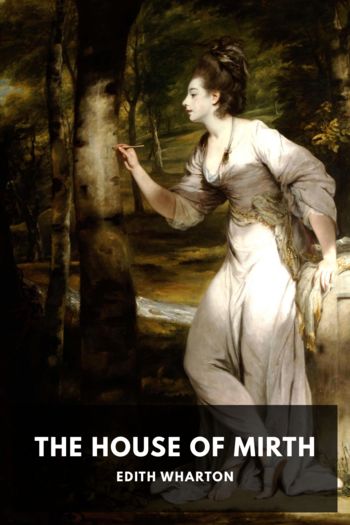The Age of Innocence - Edith Wharton (8 ebook reader .txt) 📗

- Author: Edith Wharton
Book online «The Age of Innocence - Edith Wharton (8 ebook reader .txt) 📗». Author Edith Wharton
The same thing struck him now; and again he became aware of a dim stir of former associations. The young man stood looking about him with the dazed air of the foreigner flung upon the harsh mercies of American travel; then he advanced toward Archer, lifted his hat, and said in English: “Surely, Monsieur, we met in London?”
“Ah, to be sure: in London!” Archer grasped his hand with curiosity and sympathy. “So you did get here, after all?” he exclaimed, casting a wondering eye on the astute and haggard little countenance of young Carfry’s French tutor.
“Oh, I got here—yes,” M. Rivière smiled with drawn lips. “But not for long; I return the day after tomorrow.” He stood grasping his light valise in one neatly gloved hand, and gazing anxiously, perplexedly, almost appealingly, into Archer’s face.
“I wonder, Monsieur, since I’ve had the good luck to run across you, if I might—”
“I was just going to suggest it: come to luncheon, won’t you? Down town, I mean: if you’ll look me up in my office I’ll take you to a very decent restaurant in that quarter.”
M. Rivière was visibly touched and surprised. “You’re too kind. But I was only going to ask if you would tell me how to reach some sort of conveyance. There are no porters, and no one here seems to listen—”
“I know: our American stations must surprise you. When you ask for a porter they give you chewing-gum. But if you’ll come along I’ll extricate you; and you must really lunch with me, you know.”
The young man, after a just perceptible hesitation, replied, with profuse thanks, and in a tone that did not carry complete conviction, that he was already engaged; but when they had reached the comparative reassurance of the street he asked if he might call that afternoon.
Archer, at ease in the midsummer leisure of the office, fixed an hour and scribbled his address, which the Frenchman pocketed with reiterated thanks and a wide flourish of his hat. A horsecar received him, and Archer walked away.
Punctually at the hour M. Rivière appeared, shaved, smoothed-out, but still unmistakably drawn and serious. Archer was alone in his office, and the young man, before accepting the seat he proffered, began abruptly: “I believe I saw you, sir, yesterday in Boston.”
The statement was insignificant enough, and Archer was about to frame an assent when his words were checked by something mysterious yet illuminating in his visitor’s insistent gaze.
“It is extraordinary, very extraordinary,” M. Rivière continued, “that we should have met in the circumstances in which I find myself.”
“What circumstances?” Archer asked, wondering a little crudely if he needed money.
M. Rivière continued to study him with tentative eyes. “I have come, not to look for employment, as I spoke of doing when we last met, but on a special mission—”
“Ah—!” Archer exclaimed. In a flash the two meetings had connected themselves in his mind. He paused to take in the situation thus suddenly lighted up for him, and M. Rivière also remained silent, as if aware that what he had said was enough.
“A special mission,” Archer at length repeated.
The young Frenchman, opening his palms, raised them slightly, and the two men continued to look at each other across the office-desk till Archer roused himself to say: “Do sit down”; whereupon M. Rivière bowed, took a distant chair, and again waited.
“It was about this mission that you wanted to consult me?” Archer finally asked.
M. Rivière bent his head. “Not in my own behalf: on that score I—I have fully dealt with myself. I should like—if I may—to speak to you about the Countess Olenska.”
Archer had known for the last few minutes that the words were coming; but when they came they sent the blood rushing to his temples as if he had been caught by a bent-back branch in a thicket.
“And on whose behalf,” he said, “do you wish to do this?”
M. Rivière met the question sturdily. “Well—I might say hers, if it did not sound like a liberty. Shall I say instead: on behalf of abstract justice?”
Archer considered him ironically. “In other words: you are Count Olenski’s messenger?”
He saw his blush more darkly reflected in M. Rivière’s sallow countenance. “Not to you, Monsieur. If I come to you, it is on quite other grounds.”
“What right have you, in the circumstances, to be on any other ground?” Archer retorted. “If you’re an emissary you’re an emissary.”
The young man considered. “My mission is over: as far as the Countess Olenska goes, it has failed.”
“I can’t help that,” Archer rejoined on the same note of irony.
“No: but you can help—” M. Rivière paused, turned his hat about in his still carefully gloved hands, looked into its lining and then back at Archer’s face. “You can help, Monsieur, I am convinced, to make it equally a failure with her family.”
Archer pushed back his chair and stood up. “Well—and by God I will!” he exclaimed. He stood with his hands in his pockets, staring down wrathfully at the little Frenchman, whose face, though he too had risen, was still an inch or two below the line of Archer’s eyes.
M. Rivière paled





Comments (0)